
The Man in the High Castle (1962) is an alternative history novel by Philip K. Dick wherein the Axis Powers won World War II. The story occurs in 1962, fifteen years after the end of the war in 1947, and depicts the life of several characters living under Imperial Japan or Nazi Germany as they rule the partitioned United States. The titular character is the mysterious author of a novel-within-the-novel entitled The Grasshopper Lies Heavy, a subversive alternative history of the war in which the Allied Powers are victorious.

Of Mice and Men is a novella written by John Steinbeck. Published in 1937, it narrates the experiences of George Milton and Lennie Small, two displaced migrant ranch workers, who move from place to place in California in search of new job opportunities during the Great Depression in the United States.

Rear Window is a 1954 American mystery thriller film directed by Alfred Hitchcock and written by John Michael Hayes based on Cornell Woolrich's 1942 short story "It Had to Be Murder". Originally released by Paramount Pictures, the film stars James Stewart, Grace Kelly, Wendell Corey, Thelma Ritter, and Raymond Burr. It was screened at the 1954 Venice Film Festival.

A humorist is an intellectual who uses humor, or wit, in writing or public speaking, but is not an artist who seeks only to elicit laughter. Humorists are distinct from comedians, who are show business entertainers whose business is to make an audience laugh. It is possible to play both roles in the course of a career. A raconteur is one who tells anecdotes in a skillful and amusing way.
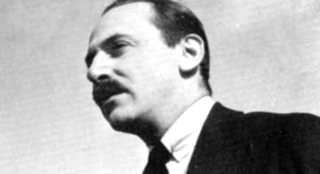
Nathanael West was an American writer and screenwriter. He is remembered for two darkly satirical novels: Miss Lonelyhearts (1933) and The Day of the Locust (1939), set respectively in the newspaper and Hollywood film industries.
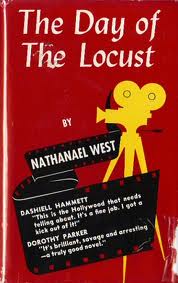
The Day of the Locust is a 1939 novel by American author Nathanael West set in Hollywood, California. The novel follows a young artist from the Yale School of Fine Arts named Tod Hackett, who has been hired by a Hollywood studio to do scene design and painting. While he works he plans an important painting to be called "The Burning of Los Angeles", a portrayal of the chaotic and fiery holocaust which will destroy the city. While the cast of characters Tod befriends are a conglomerate of Hollywood stereotypes, his greater discovery is a part of society whose "eyes filled with hatred", and "had come to California to die". This undercurrent of society captures the despair of Americans who worked and saved their entire lives only to realize, too late, that the American dream was more elusive than they imagine. Their anger boils into rage, and the craze over the latest Hollywood premiere erupts violently into mob rule and absolute chaos.
A recurring character is a fictional character, usually in a prime time TV series, who frequently appears from time to time during the series' run. Recurring characters often play major roles in more than one episode, sometimes being the main focus. They may be contrasted with "regular" characters, who typically appear in every or almost every episode of a series. Recurring characters appear less frequently than regulars, but more frequently than guest star characters, who may appear in only one or two episodes without being expected to return.
A shrike is a passerine bird of the family Laniidae.

William Lee Tracy was an American stage, film, and television actor. He is known foremost for his portrayals between the late 1920s and 1940s of fast-talking, wisecracking news reporters, press agents, lawyers, and salesmen. From 1949 to 1954, he was also featured in the weekly radio and television versions of the series Martin Kane: Private Eye, as well as starring as the newspaper columnist Lee Cochran in the 1958–1959 British-American crime drama New York Confidential. Later, in 1964, he was nominated for an Academy Award for Best Supporting Actor and a Golden Globe for his supporting role in the film The Best Man.

Lonelyhearts, also known as Miss Lonelyhearts, is a 1958 American drama film directed by Vincent J. Donehue. It is based on the 1957 Broadway play by Howard Teichmann, which in turn is based on the 1933 novel Miss Lonelyhearts by Nathanael West.

An advice column is a column in a question and answer format. Typically, a reader writes to the media outlet with a problem in the form of a question, and the media outlet provides an answer or response.
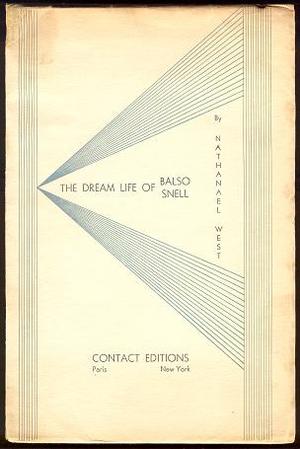
The Dream Life of Balso Snell is a 1931 novel by American author Nathanael West. West's first novel, it presents a young man's immature and cynical search for meaning in a series of dreamlike encounters inside the entrails of the Trojan Horse.
Lonely Hearts, Lonelyhearts or Lonely Heart may refer to:

Marion Meade was an American biographer and novelist. She was best known for her portraits of writers and filmmakers.
Laughter: An Essay on the Meaning of the Comic is a collection of three essays by French philosopher Henri Bergson, first published in 1900. It was written in French, the original title is Le Rire. Essai sur la signification du comique. As Mark Sinclair comments in Bergson (2020): with this essay 'Bergson belongs to the small number of major philosophers to have addressed in depth the topic of laughter and the comic as its source'. Furthermore, that the essay is 'a transitional, pivotal moment in Bergson's philosophy as a whole'.
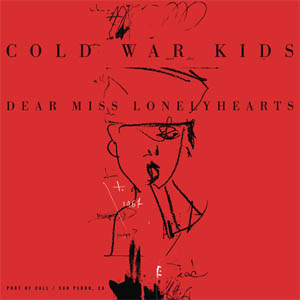
Dear Miss Lonelyhearts is the fourth studio album by American indie rock band Cold War Kids. The album was released on April 2, 2013, through Downtown Records.

Advice to the Lovelorn is a 1933 American pre-Code drama film directed by Alfred L. Werker and starring Lee Tracy, Sally Blane, Paul Harvey and Sterling Holloway. The film was released on December 1, 1933, by United Artists. It is based on the novel Miss Lonelyhearts by Nathanael West with a number of changes made.
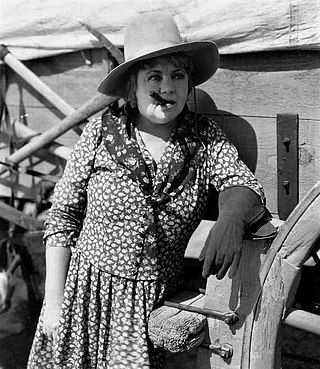
May Blossom Boley was an American actress known for her role as Whale Oil Rosie in Moby Dick (1930).
Lillian Lauferty was an American writer whose works appeared in newspapers, magazines, and radio scripts. She was perhaps best known for her newspaper columns published with the byline Beatrice Fairfax.
Our Master's Voice: Advertising is a 1934 book of social criticism about the propaganda purpose of advertising under capitalism. Author James Rorty drew on his experience as an ad copywriter in New York to write his critique. Rorty pointed out the frequent application of the then-new fields of psychology and social science for advertising research.














